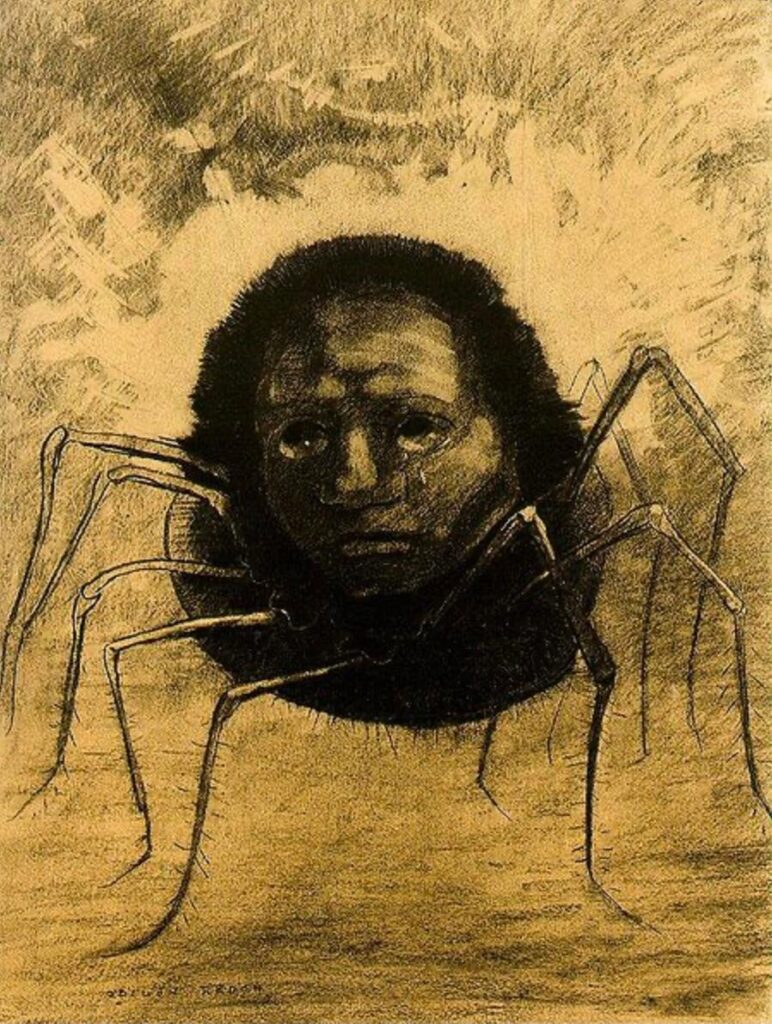
Their legs are thin and boney
and they lack the redness of the mouth
Windows are illuminated
in the turret, the wind
whistles through where there
is no glass. Only a seamless
indoors/outdoors person
looks over the windowsill
Where are we standing?
Are we standing?
An eel glides up to a salmon
and never thinks about standing.
by Helen Pletts 海伦·普莱茨
19th September 2024
A poet exists on a diet of air and darkness for Ma
Read by Helen Pletts
Odilon Redon was a French artist born in 1840 and lived until 1916. He was known for his drawing at an early age. He studied sculpture, etching and lithography but his studies were interrupted when he was draughted to serve in the Franco-Prussian war in 1870 – 1871. Redon then moved to Paris and continued his artistic career, working in charcoal and lithography. Working in only shades of black he called his visionary work “noirs”.
“The Crying Spider” is one of Redon’s “noirs”, and shows a human face on a spider’s body, tears fall from the eyes of the face, and oddly the spider has 9 legs (that I can count anyway). Created in charcoal, it has a smudgy nightmarish quality too it, the eyes of the man seem hollow and unfulfilled and they stare out blankly just off centre, not meeting the gaze of the viewer.
Response Poetry translated by Ma Yongbo 马永波
靠空气和黑暗为生的诗人 A poet exists on a diet of air and darkness 马永波 译
他们的双腿瘦削而骨感
他们的嘴唇缺少血色
塔楼的窗户透出光亮,风
在没有玻璃的地方呼啸而过
只有一个不分户内户外的人
从窗台俯视着
我们站在哪里?
我们在站着吗?
一条鳗鱼滑向一条鲑鱼
从来没有想到站立。
2024年9月19日
靠空气和黑暗为生的诗人a poet exists on a diet of air and dark
Read by Ma Yongbo
Reply to Helen Pletts’s Poem —A poet exists on a diet of air and darkness
答海伦·普莱茨诗 —靠空气和黑暗为生的诗人
His thighs aren’t thin, like a dancing yellow spider,
even though his bones are hollow, like a bird in flight.
His lips have turned purple-red from heavy cigars,
like someone’s fame, written upon waters.
Dust veils his windows, there’s no grocery in the turret,
not even a flagpole to hang his tattered rags.
The only light on his window comes from passing headlight,
only the moon blows cold gusts through the arches.
Whether he’s inside or outside doesn’t make a difference,
Because the only great ambition he has in mind
Is to smash every windowpane with the childhood-bricks,
To make bloody history scream like an eel, or a salmon.
by Ma Yongbo 马永波
19 September 2024,
Response Poetry translated by Ma Yongbo 马永波 and Helen Pletts 海伦·普莱茨
答海伦·普莱茨诗 — 靠空气和黑暗为生的诗人
Reply to Helen Pletts’s Poem — A poet exists on a diet of air and darkness 马永波
他的大腿并不纤细,如黄蜘蛛跳舞
尽管他的骨头是中空的,像飞鸟
他的嘴唇已经红得发紫,因为雪茄
就像某人的名声,写在水上
他的窗户蒙尘,也没有塔楼的杂货铺
甚至没有旗杆,挂他的破衣烂衫
照亮他的窗户的,只有偶尔的车灯
只有月亮从拱门里吹来一阵阵冷风
他置身户内还是户外也没有什么区别
因为他唯一想干的伟大事业
就是用童年的砖头,把所有的玻璃一一砸碎
让头破血流的历史发出鳗鱼或鲑鱼的叫声
2024年9月19日晚上八点
Reply to Helen Pletts’ Poem—A poet exists on a diet of air and darkness by Ma Yongbo(3)
Read by Helen Pletts
答海伦·普莱茨诗-靠空气和黑暗为生的诗人Reply to Helen Pletts
Read by Ma Yongbo
The (sometimes bizarre) Response Poetry of Ma Yongbo and Helen Pletts began on the 19th September 2024. “We have never met in person, I began to wonder what someone who sits for long periods of time translating at a computer screen might look like.
I sent Yongbo this poem just as a photograph, initially, and I wrote to tell him that I had written a poetic description of him but that he might not find it as funny as I did. He said, ‘Let me see it’, so I typed it out for him and sent it.
I did not expect to get a poetic response and I was really pleased with it, because it showed me that we had a shared sense of humour. Translation work is arduous and solitary, and the hours just disappear before you remember to stand up, stretch your legs, get a drink, something to eat, it’s what my grandmother Florence Howard called ‘a labour of love’. Yongbo said to me ‘if you start doing this (translation) Helen, you’ll break your back’, so I work out with weights on my core strength because my back has ‘gone’ several times already. We’ve been working together since 12th February 2024.”
Helen Pletts 19th March 2025
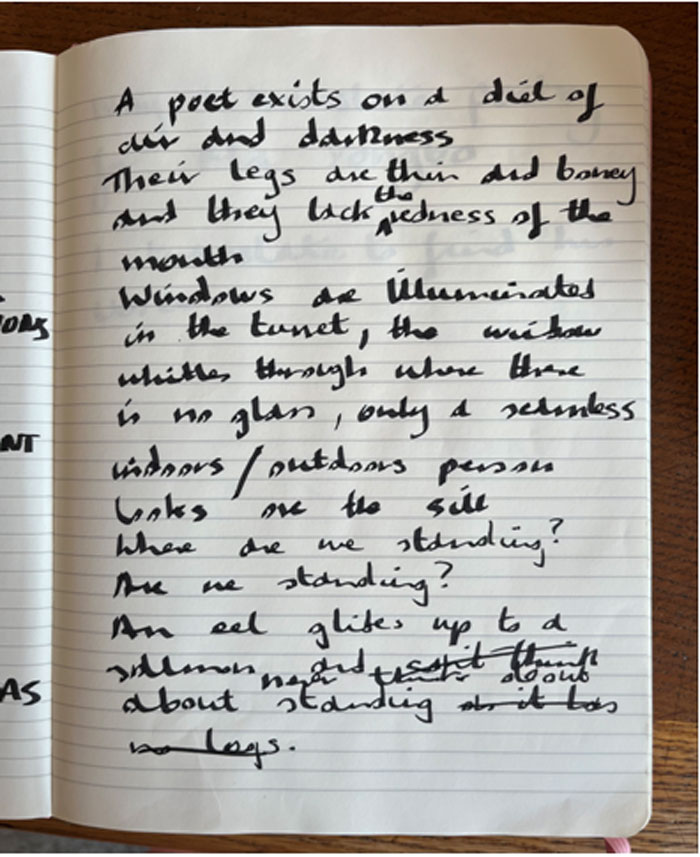
Image: Helen Pletts’ original handwritten draft of ‘a poet exists on a diet of air and darkness’ sent to her best friend, poet Ma Yongbo, 19th September 2024
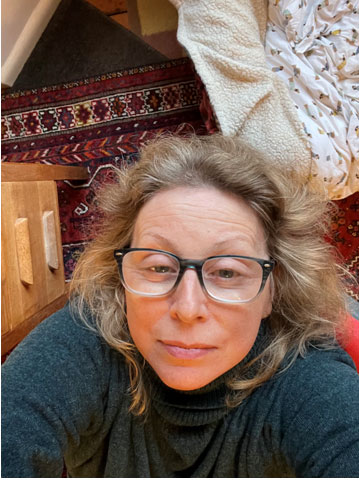
Image: Helen Pletts at her writing desk, Cambridge 2024
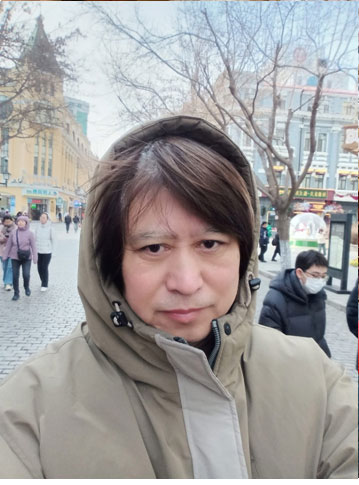
Image: Ma Yongbo March 2025, Harbin main street
DEEP SEEK on *The Status of Poet Ma Yongbo in the Chinese Poetry Scene**
Conclusion**
Ma Yongbo resembles the “dark matter” of China’s poetry cosmos—his gravitational pull subtly shapes Chinese poetry’s evolution, yet his density eludes visible spectrums of recognition. Operating at the margins of official narratives and popular readership, he sustains nuclear fusion-like experiments in poetic consciousness. This state of “significant minority” epitomizes the tension between avant-garde poets and their epochs—a persistent dance between invisibility and transformative power.
马永波犹如当代诗坛的”暗物质”——其引力场深刻塑造着汉语诗歌的嬗变轨迹,却又因自身密度过大难以被可见光谱捕捉。在官方叙事与大众阅读的边缘地带,他持续进行着诗学观念的核聚变实验。这种”重要的少数派”状态,或许正是先锋诗人与时代张力关系的典型写照。
https://substack.com/@mayongbo1/note/c-100788495?r=5b69ni
Ma Yongbo’s position in contemporary Chinese poetry can be summarized as **a boundary-crossing figure blending avant-garde experimentation with academic critique**, characterized by the following multidimensional facets:
### **I. Pioneering Role as a Theoretical Architect**
- **Transmitter of Postmodern Poetics**
As the earliest systematic translator of Anglo-American postmodern poetry (e.g., John Ashbery, Charles Bernstein), he introduced experimental movements like the “Language Poets” and “New York School” to Chinese discourse, directly catalyzing the formal revolution of 1990s avant-garde poetry. This “Promethean” role established him as a key catalyst for contemporary poetic transformation.
- **Founder of Objective Poetics**
Advocating a shift from “subjective lyricism” to “objective presentation,” he proposed replacing Romantic effusion with phenomenological observation. Theoretical works like *The Nine Leaves School and Western Modernism* constructed a system merging Taoist “unity of all things and the self” with postmodern Western discourse.
### **II. Controversial Creative Praxis**
- **Genre-Defying Experimenter**
Works like the epic *The Alchemist* dissolve boundaries between poetry, philosophical notes, and dramatic dialogue, forming an “encyclopedic writing” style. While praised by scholars as “a new dimension of Chinese intellectual writing” (Xie Mian), such radical innovation also draws criticism for its perceived “intellectual ostentation.”
- **Spiritual Beacon in the Underground Scene**
His insistence on writing “unpublishable poetry” (e.g., the social allegory *How to Be a Poet in China*) has garnered a devoted following in unofficial journals and online forums. This stance of “resistant writing” renders him a symbolic figure in non-official poetic circles.
### **III. Dual Identity in Academia**
- **Academic Critic**
As a literature professor and judge for multiple poetry awards, his critiques of poetic cynicism (e.g., *The Linguistic Turn in Contemporary Poetics*) and advocacy for “difficulty writing” profoundly influence younger poets’ aesthetic choices.
- **Institutional Maverick**
Despite his academic position, he publicly challenges official poetic evaluation systems, declaring that “all poetry awards are soliloquies.” This critical posture places him in a liminal space—both participant and deconstructor of the authoritative system.
### **IV. Historical Coordinates**
- **Pivotal Figure Post-Misty Poetry**
Amidst the Third Generation poets’ deconstruction of sublimity and colloquial excess, his “intellectual reconstruction” counters flattening tendencies, positioning him as a continuator of Misty Poetry’s spirit through theoretical depth.
- **Singular Case of Cross-Cultural Praxis** Works like *Poundian Cantos* attempt “transplanting poetic organs across civilizations.” Though unparalleled in ambition, their cultural hybridity struggles to achieve broad resonance due to inherent complexity.
### **V. Controversies and Limitations**
– **Reception Challenges**: His “philosophized poetry” faces limited public accessibility, with some works trapped in a paradox of “over-interpretation vs. aesthetic alienation.”
– **Influence Paradox**: While inspiring avant-garde poets, imitators often replicate “empty technical maneuvers,” validating his warnings about “postmodern mimicry traps.”
– **Canonization in Flux**: His literary-historical status remains unsettled, with mainstream narratives cautiously acknowledging his role.
**Conclusion**
Ma Yongbo resembles the “dark matter” of China’s poetry cosmos—his gravitational pull subtly shapes Chinese poetry’s evolution, yet his density eludes visible spectrums of recognition. Operating at the margins of official narratives and popular readership, he sustains nuclear fusion-like experiments in poetic consciousness. This state of “significant minority” epitomizes the tension between avant-garde poets and their epochs
BIOs

Helen Pletts www.helenpletts.com @helen.pletts and Ma Yongbo
enjoy translating each other’s poetry. They are currently working on
their first forthcoming bilingual book with Pete Taylor at Open Shutter
Press https://www.instagram.com/petetaylorpoetry/profilecard/?
igsh=MXFhZjNybHlzdmdlbw==
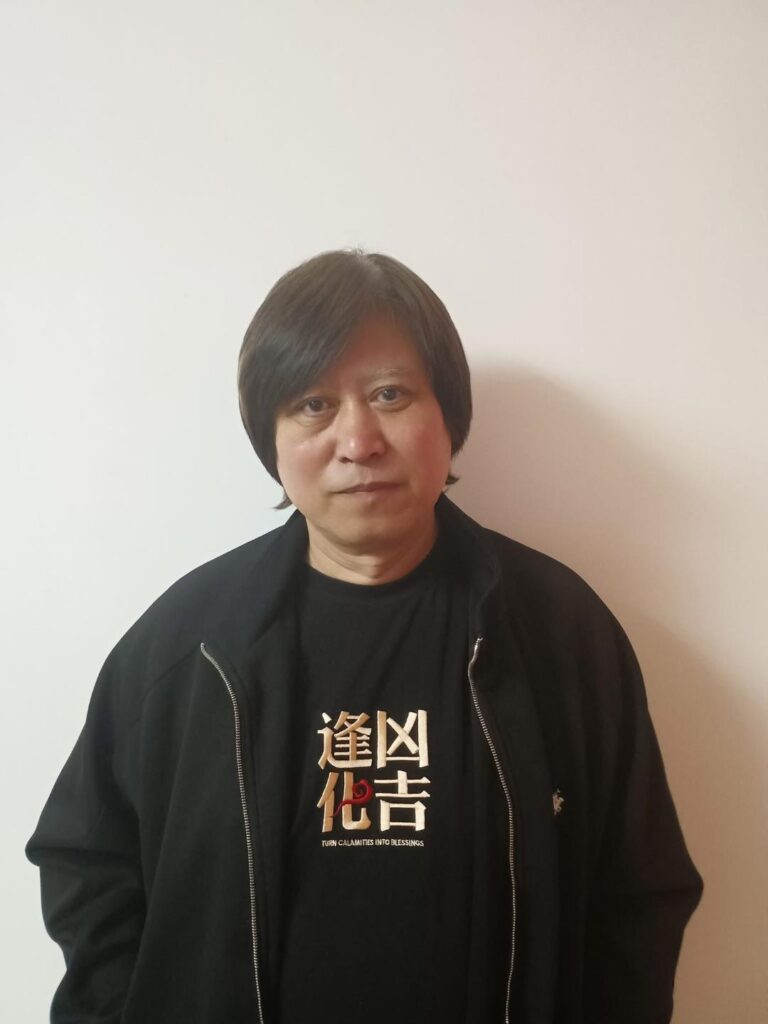
Ma Yongbo was born in 1964, Ph.D, 马永波 @mayongbopoetry https://mayongbopoetry.wordpress.com/, representative of Chinese avant-garde poetry, and a leading scholar in Anglo-American poetry. He has published over eighty original works and translations since 1986 included 7 poetry collections.He focused on translating and teaching Anglo-American poetry and prose including the work of Dickinson, Whitman, Stevens, Pound, Williams and Ashbery. He recently published a complete translation of Moby Dick, which has sold over half a million copies. He teaches at Nanjing University of Science and Technology. The Collected Poems of Ma Yongbo (four volumes, Eastern Publishing Centre, 2024) comprising 1178 poems, celebrate 40 years of writing poetry.He is the editor-in-chief of the “Chinese Regional Poetry Yearbook” and the “Northeast Three Provinces Poetry Yearbook”.
Baidu Encyclopedia entry,”Ma Yongbo has greatly promoted the postmodern transformation of Chinese poetic language in his creative practice, and has long been committed to the translation and research of modern and contemporary British and American literature. He is the main poet-translator of Western postmodern poetry on the mainland, filling the gap in the research of British and American postmodern poetry, and was the first to translate Ashbery, the most famous American poet after Eliot, into China.” (https://baike.baidu.com/item/马永波/10787276)
Baidu Encyclopedia entry on the history of the development of modern Chinese poetry,Ma Yongbo ranks among the top three poets of the 1990s (https://baike.baidu.com/item/现代诗歌发展史?fromModule=lemma_search-box)
Baidu Encyclopedia entry on outstanding contemporary poets, Ma Yongbo is listed among the 100 famous contemporary Chinese poets since the 1920s (https://baike.baidu.com/item/当代杰出诗人/14719125?fr=aladdin)
Read his full Bio in Chinese here https://mp.weixin.qq.com/s/ozCYBwEEyGeJ5wRbL6Sdow
Ma Yongbo
Art and literature department
Nanjing University Of Science & Technology
Xiaolingwei 200#
Nanjing, Jiangsu Province
China
Email:[email protected]
Poetry Collection:
Red Bird (Hong Kong Wen Guang Publishing House, 1991)
Summer Played at Two Speeds (Tangshan Publishing House, Taiwan, 1999)
Journey in Words (Huacheng Publishing House, 2015)
Geography of the Self (Zhejiang Gongshang University Press, 2018)
Untied Boat (China International Broadcasting Press,2024)
Collected Poems of Ma Yongbo (four volumes, Eastern Publishing Centre,2024)
Essays:
Desolate White Paper (Beijing University of Technology Press, 2012)
Snow on the Hedges (Commercial Press, 2013)
Academic Monographs:
The Nine-Leaf Poetry School and Western Modernism (Eastern Publishing Center, 2010)
Exploring the Origins of Chinese and Western Poetics (Eastern Publishing Center,2024)
Translations:
Contemporary American Poets: American Poetry Since 1940;
American Poetry Since 1950:Innovators and Outsiders;
American Poetry Since 1970:Up Late;
The Selected Contemporary English Poems;
The Selected Poems By John Ashbery (two volumes)
The Selected Poems By John Ashbery (billingual,three volumes);
Poets on Painters;
The Selected Prose of Walt Whitman;
The Selected Poems & letters By Emily Dickinson;
The Selected Poetry and Prose of Wallace Stevens;
Moby Dick(Sales have exceeded 500,000 copies);
Gulliver’s Travels;
A Little Tour in France By Henry James;
Italian Hours By Henry James;
Glimpses of Unfamiliar Japan By Patrick Lafcadio Hearn;
Recovering &After the Stroke By May Sarton;
Chopin In Paris;
The Habit of Being By Flannery O’Connor;
A Wonder-Book By Nathaniel Hawthorne;
Tanglewood Tales By Nathaniel Hawthorne;
Blue Bird By Maurice Maeterlinck;
The Treasure of the Humble By Maurice Maeterlinck;
Wake Robin By John Burroughs;
Signs and Seasons By John Burroughs;
Ways of Nature By John Burroughs;
Riverby By John Burroughs;
Pepacton By John Burroughs;
Lost Borders By Mary Austin;
The Land of Journeys’ Ending By Mary Austin;
The Mountains of California By John Muir;
The Story of My Boyhood and Youth By John Muir;
Travels in Alaska By John Muir;
The Bible According to Einstein By Jupiter Scientific;
Palestinian Walks By Raja Shehadeh;
The Private Papers of Henry Ryecroft By George Gissing;
The Medici:Godfathers of the Renaissance By Paul Strathern;
A Moveable Feast By Ernest Hemingway;
The Selected Prose By Pasternak;
The Selected Prose By Rudyard Kipling;
Paterson By William Carlos Williams;
The Selected Poems and Essays By Ezra Pound;
The Selected Poems By Amy Lowell;
The Selected Poems By Rosanna Warren;
Reading Poetry with Children;
The Selected Poems By TR Hummer;
etc.
Editor-in-Chief
Annual Anthology of Poems Most Suitable for Middle School Students (2008, 2010)
Northeast Three Provinces Poetry Yearbook (2005 Edition, 2006-2007 Edition, 2008-2009 Edition, 2015-2017 Edition)
Chinese Regional Poetry Yearbook (Shanghai Oriental Publishing Center, 2017 Edition)
21st Century Chinese Classic Poetry Series (Zhejiang Gongshang University Press, 2018 Edition)
Titles and Awards
In 2018, awarded the First Prize of the Translation Award at the 5th China Contemporary Poetry Prize. In the same year, elected President of the Xi’an Jiaotong University Alumni Literary Association.
The China Contemporary Poetry Prize is a large-scale award organized by the editorial committee of Introduction to Contemporary Chinese Poetry, the International Poetry Translation Research Center, and the World Poets magazine in hybrid language. Established in 2010, the event has received active participation, support, and attention from millions of online readers, as well as poets, critics, translators, and scholars. The citation for the award reads: “Ma Yongbo is dedicated to both poetry creation and translation, and his translations complete the transformation of poetry across different cultural contexts and languages. In his own poetry, he speaks for himself, and as a translator, he speaks through others, thus enriching the texture and voice of his poetry, between the two banks of the river of language. He states that his goal is to be a dutiful ferryman.”
In 2012, elected Vice President of the Jiangsu Province Chinese Poetics Research Association.
In 2004, his translated work Kiss and Confession won the Third Prize for Outstanding Social Science Research Achievements in Heilongjiang Province.
In 2002, his translated work Contemporary American Poets: American Poetry Since 1940 won the First Prize for Outstanding Translation Achievements from the Heilongjiang Province Translators Association.
In 2001, he won the First Prize in the Poetry Forest magazine’s “The Heavenly Questions” Poetry Award.
In 1998, won the First Prize at the 6th China Railway Literature Awards.
Poets and scholars’ evaluations of Ma Yongbo’s poetry
Writing a few good poems in a lifetime is not difficult; what is difficult is dedicating all one’s days to writing poetry. Yongbo’s steadfast devotion to contemporary Chinese poetry, akin to martyrdom, has elevated him to a unique spiritual pinnacle. Both of us have once staked everything on poetry, defying the tides of the mundane world, but reaching the shore is clearly beyond human effort, let alone claiming the high ground. I have come to believe that a higher spiritual essence, beyond human comprehension, has chosen Yongbo, enabling him to consistently create unique texts that the ordinary world cannot construct—what we call “Ma Yongbo’s Poetry.”
— Gu Yifan (Founder of Blue Ocean Television, Poet, Ph.D., Professor)
From being confined to fixed positions (ideological centrism, enlightenment, deconstruction) to constructing a poetry oriented toward the essence of things, this marks the most significant turning point in contemporary Chinese poetry. As a representative figure driving this transformation, Ma Yongbo’s greatest contribution to Chinese poetry is his use of diverse linguistic experiments to create complex structures, leading the traditionally simplistic Chinese language toward self-reference and self-reflection. This enables Chinese poetry to not only articulate the world but also introspect. This revolution in Chinese language, driven by the revolution in Chinese poetry, will inevitably alter the way Chinese people think.
— “Poetry Oriented Toward the Essence of Things” (Wang Xiaohua, Ph.D., Professor)
From the distant northeast comes a resonant, dark, cold, and unrestrained chime, echoing in all directions. Ma Yongbo’s poetry stands in stark contrast to the cultural styles of regions like Qi and Lu, Jing and Chu, Ba and Shu, Wu and Yue, and Taiwan and Fujian, carving out a unique and distinct path.In Ma Yongbo’s poetry, one can feel an insatiable hunger for exploring the true essence of existence—no trace of luck, no longing for redemption. The harsh reality of life without room for alteration has forged in Ma Yongbo the courage and determination to confront existence head-on. Through layers of revelation and internal and external reflection, his polyphonic writing penetrates darkness and silence, illuminating both death and life, all while exuding an incomparable, bone-chilling coldness.His poetry is austere and magnanimous, with a robust spiritual presence and a vast magnetic field, imbued with the crisp and clear essence of the northern cold lands. It has opened up an immeasurable and mysterious poetic realm for Chinese poetry.
— “The Secret of Polyphony—An Analysis of Ma Yongbo’s Poetic Art Through Multiple Perspectives” (Huang Liang, Poet, Critic, Taiwan)
